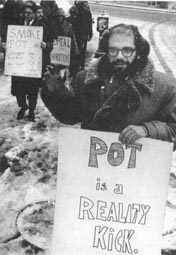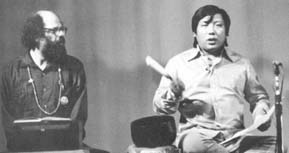Alan Ginsberg
 Allen Ginsberg was born in New Jersey on June 3rd, 1926. His father was a teacher and socialist and his
mother was a schizophrenic who was permanently committed when Allen was in his teens.
Allen Ginsberg was born in New Jersey on June 3rd, 1926. His father was a teacher and socialist and his
mother was a schizophrenic who was permanently committed when Allen was in his teens.
He was homosexual and enrolled in Columbia University because a boy on whom he had a crush in high school went there. He met William Burroughs, Lucian Carr and Jack Kerouac and became involved in a drug and petty crime milieu. Burroughs was a remittance man, Carr a pretty boy who later murdered his obsessed, homosexual lover and Kerouac a failed athlete from a working class background obsessed with becoming a writer.
As a group, influenced by the fin-de-siecle 'Decline of the West', they evolved a 'New Vision' of life rejecting traditional literary forms, free from the constraints of "straight" society, of a drug induced wider consciousness, of writing and poetry and intense relationships and "kicks" that later became known as the "Beats" and parodied as the "beatniks".
 In 1948 while living alone and dejected after the collapse of his romantic and sexual dreams
with Neal Cassady he went through a psychotic period of alternating euphoria and paranoia. His family and friends believed he was also suffering
schizophrenia but Ginsberg understandably preferred to interpret the experience as a mystical, spiritual vision of the poet William Blake.
In 1948 while living alone and dejected after the collapse of his romantic and sexual dreams
with Neal Cassady he went through a psychotic period of alternating euphoria and paranoia. His family and friends believed he was also suffering
schizophrenia but Ginsberg understandably preferred to interpret the experience as a mystical, spiritual vision of the poet William Blake.
In 1956 he wrote 'Howl' in a benzedrine fuelled writing session and became a media personality:
I saw the best minds of my generation destroyed by madness, starving hysterical naked,
dragging themselves through the negro streets at dawn looking for an angry fix
angelheaded hipsters burning for the ancient heavenly connection to the starry dynamo in the machinery of night.
 Of course, if Ginsberg did know any of the best minds of his generation they certainly weren't the
people he was referring to. His earnestness and outspoken public views on drugs and homosexuality made him the most famous "poet" of the modern age. His skills as an agent,
publicist and networker among the gay literary mafia single handedly got the Beat "canon" published. He became a media personality most famous for his famous friends and his
interminable performances of chanting and poetry reading wherever a protest against the Vietnam war, or just about anything was available.
Of course, if Ginsberg did know any of the best minds of his generation they certainly weren't the
people he was referring to. His earnestness and outspoken public views on drugs and homosexuality made him the most famous "poet" of the modern age. His skills as an agent,
publicist and networker among the gay literary mafia single handedly got the Beat "canon" published. He became a media personality most famous for his famous friends and his
interminable performances of chanting and poetry reading wherever a protest against the Vietnam war, or just about anything was available.
In 1962, during a trip to Europe Burroughs almost caused Ginsberg a nervous breakdown and Gregory Corso lost Ginsberg's money gambling. He was saved by a cheque from a film magazine that wouldn't publish the article he had written because it contained the word "shit". Ginsberg and long time companion Peter Orlovsky went to India for 18 months. Ginsberg would go down to the river and smoke bhang all day with the "sadhus" and Orlovsky would shoot up heroin or morphine depending what he could score and on a US Army pension for madness you can score a lot in India.

They went travelling with Gary Snyder (above left) & his wife, Joanne Kyger. Snyder was probably the only Beat figure who practised a spiritual discipline and had spent four years in Kyoto studying at the First Zen Institute at Daitoku-ji Monastery. Ms Kyger found them difficult travelling companions as Orlovsky took drugs all night and vomited all morning. After seeing Swami Sivananda they were granted an audience with the young Dalai Lama. Snyder finally had to stop Ginsberg haranguing the Dalai Lama about drugs and homsexuality so he could ask some questions.
 Ginsberg had an unrealistically bleak view of US society, against all the evidence and the history of the last
100 years, he always believed it was about to collapse, either because of the evils of the "military-industrial complex" fascist police state, the nuclear energy industry,
environmental degradation or whatever his current obsession. His own life is testimony to the inefficiency of the US police in controlling illegal drug use even in public figures
who champion their use. He had vowed to widen his area of consciousness and had systematically explored his mind, using stronger and stronger drugs: heroin, mescaline, peyote,
LSD, psilocybin, ayahuasca. But with the more poweful hallucogens he encountered an inhuman serpent monster, a vision of death, and it developed that if he took drugs he would start
vomiting with anxiety. Yet he still felt it his duty to take them, for the sake of an expanded consciousness. He felt compelled to break down his identity and seek a "more direct
contact with primate sensation, nature."
Ginsberg had an unrealistically bleak view of US society, against all the evidence and the history of the last
100 years, he always believed it was about to collapse, either because of the evils of the "military-industrial complex" fascist police state, the nuclear energy industry,
environmental degradation or whatever his current obsession. His own life is testimony to the inefficiency of the US police in controlling illegal drug use even in public figures
who champion their use. He had vowed to widen his area of consciousness and had systematically explored his mind, using stronger and stronger drugs: heroin, mescaline, peyote,
LSD, psilocybin, ayahuasca. But with the more poweful hallucogens he encountered an inhuman serpent monster, a vision of death, and it developed that if he took drugs he would start
vomiting with anxiety. Yet he still felt it his duty to take them, for the sake of an expanded consciousness. He felt compelled to break down his identity and seek a "more direct
contact with primate sensation, nature."
 In later life Ginsberg tried to became more serious about spiritual practice. He realized he'd spent years
chanting and publicising Indian spirituality of which he really knew nothing. He naturally settled on Chogyam Trungpa Rinpoche as his teacher, the most controversial, drunken philandering Rinpoche available. He became involved in the Trungpa's Naropa Insitute and the controversies surrounding Trungpa's increasingly
controversial life, especially damaging after Trungpa's followers assaulted the poets Merwin and Naone at a drunken "meditation retreat" and the resultant "poetry wars".
Meditation proved difficult and was something he never practiced consistently as required by the teachings due to his hectic schedule and priorities. Ginsberg took Trungpa's advice and started wearing a suit and white shirt and straight away people began treating him as the respected elder statesmen of American poetry. He kept everything he ever wrote and opened his life and papers to any gay graduate student looking to write a thesis. His genius at networking and promotion was legendary but his attempts at a spiritual discipline and understanding were fragmented and narcissistic. He continually attempted to gain a wider audience with songs and music but was met with derision and commercial failure. He is in most respects an unlikely promoter of the "spiritual life" and meditation but has been an important influence in the publicity given to these subjects over the last 50 years.
In later life Ginsberg tried to became more serious about spiritual practice. He realized he'd spent years
chanting and publicising Indian spirituality of which he really knew nothing. He naturally settled on Chogyam Trungpa Rinpoche as his teacher, the most controversial, drunken philandering Rinpoche available. He became involved in the Trungpa's Naropa Insitute and the controversies surrounding Trungpa's increasingly
controversial life, especially damaging after Trungpa's followers assaulted the poets Merwin and Naone at a drunken "meditation retreat" and the resultant "poetry wars".
Meditation proved difficult and was something he never practiced consistently as required by the teachings due to his hectic schedule and priorities. Ginsberg took Trungpa's advice and started wearing a suit and white shirt and straight away people began treating him as the respected elder statesmen of American poetry. He kept everything he ever wrote and opened his life and papers to any gay graduate student looking to write a thesis. His genius at networking and promotion was legendary but his attempts at a spiritual discipline and understanding were fragmented and narcissistic. He continually attempted to gain a wider audience with songs and music but was met with derision and commercial failure. He is in most respects an unlikely promoter of the "spiritual life" and meditation but has been an important influence in the publicity given to these subjects over the last 50 years.
Bibliography:
- Ginsberg A Biography
Barry Miles
Hagiography by a long time Ginsberg associate that doesn't attempt to sanitise his picture of Ginsberg for the "squares" too much. - Dharma Lion A Critical Biography
Michael Schumacher
It's unlikely that anybody naming a book about Ginsberg 'Dharma Lion' would be capable of critical thinking about him and Schumacher certainly proves this point. A lot more detailed than Miles' biography and somewhat more sanitised also, twice the words and half the drugs and sex of Mile's book. - Off The Road
Carolyn Cassidy
By wife of central Beat figure Neal Cassady - The Beats
Ann Charter - The Birth of the Beat Generation
Steven Watson
Good short introduction, with plenty of pictures for the non-literate.
Back to Gurus Page.